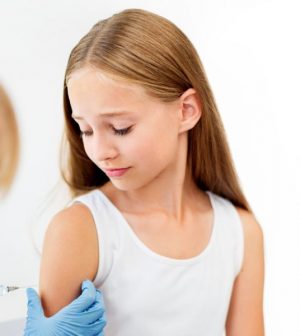- Recognizing the Signs of Hypothyroidism
- 10 Strategies to Overcome Insomnia
- Could Artificial Sweeteners Be Aging the Brain Faster?
- Techniques for Soothing Your Nervous System
- Does the Water in Your House Smell Funny? Here’s Why
- Can a Daily Dose of Apple Cider Vinegar Actually Aid Weight Loss?
- 6 Health Beverages That Can Actually Spike Your Blood Sugar
- Treatment Options for Social Anxiety Disorder
- Understanding the Connection Between Anxiety and Depression
- How Daily Prunes Can Influence Cholesterol and Inflammation
When Will Kids Get the COVID Vaccines?

For parents with questions about COVID-19 vaccines and children, Johns Hopkins Medicine experts offer answers.
While vaccinations for adults are underway in the United States, clinical trials for the first U.S. Food and Drug Administration-authorized COVID-19 vaccines haven’t yet been completed for children and teens younger than 16.
Before that age group can receive a vaccine, the FDA and U.S. Centers for Disease Control and Prevention must accept clinical trial results showing the vaccines are safe and effective in youngsters, explained Dr. Aaron Milstone, a professor of pediatrics at Hopkins’ School of Medicine, and Dr. Kawsar Talaat, assistant professor at the Bloomberg School of Public Health, in Baltimore.
At this time, Pfizer’s COVID-19 vaccine has FDA approval for use in people 16 and older, while children aged 12 to 15 have been enrolled in clinical trials of the vaccine.
The Moderna vaccine has FDA approval for use in people 18 and older, while children aged 12 to 17 are being enrolled in trials of the vaccine.
COVID-19 vaccines for children older than 12 years may be authorized by late spring or early summer, but it may be late 2021 or 2022 before vaccines are authorized for those younger than 12, the doctors said.
When children can actually get vaccinated will depend on the vaccine supply, the experts noted in a Hopkins news release. Currently, vaccines are being distributed to groups of people based on priority.
Until youngsters can get vaccinated, parents should protect their children from COVID-19 by continuing to practice prevention measures, such as wearing face masks, maintaining safe physical distance from others and by practicing appropriate hand hygiene, Milstone and Talaat advised.
More information
The American Academy of Pediatrics has more on COVID-19.
SOURCE: Johns Hopkins Medicine, news release, Feb. 9, 2021
Source: HealthDay
Copyright © 2026 HealthDay. All rights reserved.










